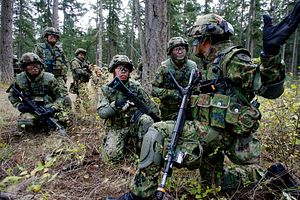Japan’s cabinet has approved a 4.98 trillion yen (approximately $42 billion) defense budget, the largest absolute sum allocated for defense in the country’s history. The defense budget marks the third straight year of increased defense spending and represents a 2.8 percent rise over Japan’s previous fiscal year. The change is consistent with other decisions regarding Japan’s defense made under the leadership of Prime Minister Shinzo Abe and the Liberal Democratic Party (LDP). Amid perceptions of an increasingly unstable East Asian region, with growing threats from a rising China and an unpredictable North Korea, Abe is eager to position Japan to practice what he describes as “proactive pacifism.”
In announcing the new defense budget, Japan’s new defense minister, Gen Nakatani, noted that the budget was necessary given the “changing situation” around Japan. “The level of defense spending reflects the amount necessary to protect Japan’s air, sea, and land, and guard the lives and property of our citizens,” he added. Nakatani additionally accused China of engaging in “dangerous actions” that destabilized the regional situation. Beijing, in a statement released on Tuesday, noted that it “firmly opposed” the Japanese minister’s comments. Nakatani responded to China’s reaction later on Tuesday noting that this comments were based on actions by the Chinese People’s Liberation Army over the past few years, including radar locking onto a Japanese Self-Defense Forces ship and conducting dangerously close fly-bys of Japanese and other aircraft. He also noted China’s fast-growing defense budget, which rose 12.2 percent to $132 billion last year.
Under the new budget, Japan will purchase new patrol aircraft, early-warning aircraft, stealth fighters, and amphibious vehicles. These acquisitions will allow Japan to better patrol its relatively large maritime exclusive economic zone (EEZ) and prepare for a potential amphibious conflict. Japanese defense planning in recent years has emphasized amphibious landing operations for a potential island retake scenario. Japan and China remain locked in a dispute over the sovereignty of the Senkaku/Diaoyu islets in the East China Sea. Japan currently administers the island but China claims them, citing their historical status as Chinese territory before the First Sino-Japanese War.
The announcement of this defense budget could upset the ever-so-slight thaw process that has emerged between China and Japan. This process began in the last few months of 2014, as symbolized by an awkward handshake between President Xi Jinping and Prime Minister Shinzo Abe at the APEC Leader’s Summit in Beijing. Just before this budget was passed, Chinese and Japanese negotiators met to discuss the establishment of a military hotline to prevent unexpected escalation — ostensibly to prevent an isolated incident or accident from spiraling into a major conflict. Should a hotline be established between Tokyo and Beijing, their ships and aircraft would also agree to share a common radio frequency in the vicinity of the Senkaku/Diaoyu Islands.
This new defense budget also anticipates the conclusion of a new set of defense cooperation guidelines for Japan and the United States. After Abe’s cabinet decided to reinterpret Article 9 of Japan’s post-war constitution to permit Japan’s Self-Defense Forces to participate in collective self-defense, the United States and Japan decided to update their defense relationship, emphasizing a more “global” role for the alliance. The United States, in general, is keen to see Japan carry a greater share of the burden of its own defense.
Japan’s increasing defense budgets also come at a time when its military industrial complex is looking to grow. Under Abe, Japan abandoned its post-war ban on selling arms and armaments to other nations. In the past two years, Japan has concluded or is in the process of negotiating defense contracts for arms exports or co-production with a variety of countries, including India, Australia, France, and the United Kingdom.
This record defense budget reveals Abe’s renewed political confidence after his victory in December’s snap election. As The Diplomat noted earlier last month, December’s snap election has left the Liberal Democratic Party (LDP) in a powerful position domestically. Despite growing economic malaise as “Abenomics” fizzles and the country’s public debt balloons, the cabinet felt confident in passing a defense budget that may seem profligate to economists, investors, and businesses.
The Japanese economy contracted 0.5 percent in 2014 and growth is forecast at 1.5 percent for the coming year. In order to successfully navigate this period of economic uncertainty and defibrillate the flatlining Japanese economy, the Abe administration will have to carefully manage public spending. Inevitably, an increase in defense spending will mandate cuts elsewhere or higher taxes for Japanese citizens and businesses.

































